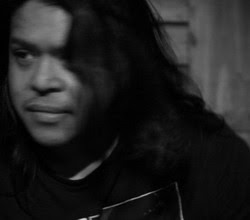 "I wish Francis 'Oggs' Cruz, Richard Bolisay, and Dodo Dayao would get space in the broadsheets, because they're far more interesting than anyone writing there regularly."—Alexis Tioseco, "Wishful Thinking for Philippine Cinema"
"I wish Francis 'Oggs' Cruz, Richard Bolisay, and Dodo Dayao would get space in the broadsheets, because they're far more interesting than anyone writing there regularly."—Alexis Tioseco, "Wishful Thinking for Philippine Cinema"According to Dodo Dayao's MySpace page, he is 102 years old and chasing pavements. He further describes himself as "writer, filmmaker, infrequent painter, random komikero [i.e., comic book enthusiast], heartthrob in a past life, monkey gone to heaven." We should all be so prolific. Not only does he administer two film sites—Is It Safe? and Piling Piling Pelikula—but, he's a team contributor to Geeks United, Korean Bug and Unspoken Cinema.
 In similar collaborative spirit, his oil paintings have been featured in group exhibitions at various galleries in the Philippines (examples can be seen at Quezon City's West Gallery website as part of three group shows: "12x9", "Them!" and "2010: The Year We Make Contact"). He's also collaborated with Khavn dela Cruz as "translator" on such films as Ang dagat na nalulunod (The Drowning Sea, 2008). His film writing—especially as reflected at Piling Piling Pelikula—is hot with incendiary irreverence. I find his poetic insights brave, searing and addictive. It's no wonder that Alexis Tioseco wished him a wider audience and I'm delighted that he was quick to respond to my set of email questions.
In similar collaborative spirit, his oil paintings have been featured in group exhibitions at various galleries in the Philippines (examples can be seen at Quezon City's West Gallery website as part of three group shows: "12x9", "Them!" and "2010: The Year We Make Contact"). He's also collaborated with Khavn dela Cruz as "translator" on such films as Ang dagat na nalulunod (The Drowning Sea, 2008). His film writing—especially as reflected at Piling Piling Pelikula—is hot with incendiary irreverence. I find his poetic insights brave, searing and addictive. It's no wonder that Alexis Tioseco wished him a wider audience and I'm delighted that he was quick to respond to my set of email questions.* * *
Michael Guillén: What do you want San Francisco audiences to understand about Filipino cinema?
Dodo Dayao: That it's not all social realism and exoticized poverty. That it is multi-colored and many-flavored and more often than not—especially these days—goes on adventures. And that there's more where all this came from.
Guillén: What do you want San Francisco audiences to understand about Lino Brocka?
Dayao: That Brocka made around 65 movies and only around 10 of them have been elevated to the canon. And that the films that didn't make it to the canon—the melodramas, the comedies, the pop films—demand as much investigation, possibly even more, than those that did. Canons are moldy and rigid and play it safe and are no fun at parties anyway. I always thought cinema should be the opposite of all these (especially the part about being fun at parties).
Guillén: How do you situate yourself within Filipino cinema and Filipino film criticism?
 Dayao: I'm a fan first, a writer second and a critic a distant third. I abandon myself to tone and voice and color, to energy of language and blood in the pulse and the beating to a pulp of all anonymity and objectivity. Cinema is all about wading knee-deep in the mud and getting your feet dirty and sometimes your heart broken. And I always thought film writing—or any kind of writing for that matter—should be as vivid and fervent and as misbehaved and as given over to the moment, not dry like a dissertation. Also, would-be film reviewers should at least know basic grammar. But there should be more film writers, if only to amp the volume of discourse. There are very few of us and the ones that are doing good work—and there are a good number of these already, mind—are either people I know or have met. I want to someday be swept off my feet with awe and envy by a complete stranger's piece. All this, of course, most likely situates me in the margins—which is really where I prefer to be.
Dayao: I'm a fan first, a writer second and a critic a distant third. I abandon myself to tone and voice and color, to energy of language and blood in the pulse and the beating to a pulp of all anonymity and objectivity. Cinema is all about wading knee-deep in the mud and getting your feet dirty and sometimes your heart broken. And I always thought film writing—or any kind of writing for that matter—should be as vivid and fervent and as misbehaved and as given over to the moment, not dry like a dissertation. Also, would-be film reviewers should at least know basic grammar. But there should be more film writers, if only to amp the volume of discourse. There are very few of us and the ones that are doing good work—and there are a good number of these already, mind—are either people I know or have met. I want to someday be swept off my feet with awe and envy by a complete stranger's piece. All this, of course, most likely situates me in the margins—which is really where I prefer to be. Guillén: If there is one Filipino film that you don't think gets enough attention, what would it be?
Guillén: If there is one Filipino film that you don't think gets enough attention, what would it be?Dayao: A trick question, as there can never be just one. But for now, let me just say that Joey Gosiengfiao's masterpiece is not Temptation Island (1980) as the world seems to think; it's Bomba Star (1980).
Cross-published on Twitch.